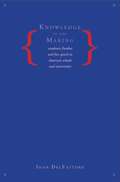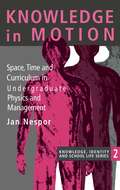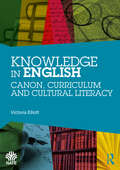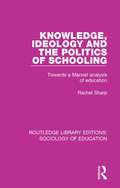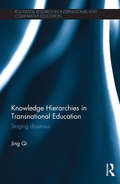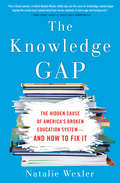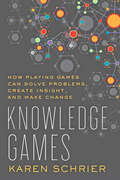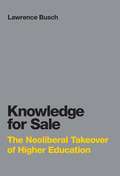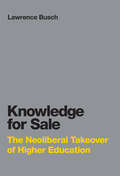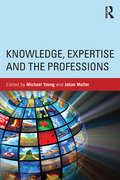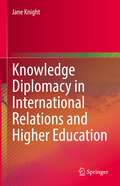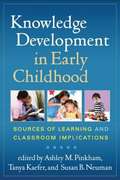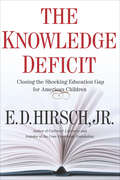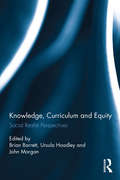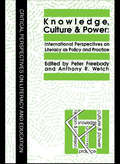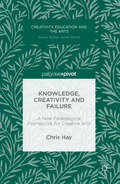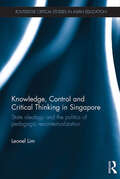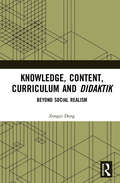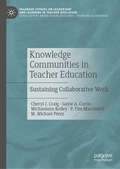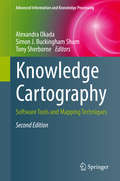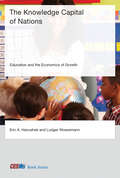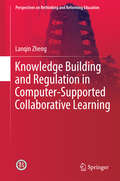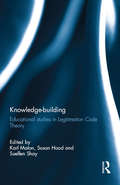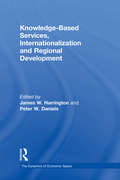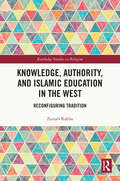- Table View
- List View
Knowledge in the Making: Academic Freedom and Free Speech in America's Schools and Universities
by Joan DelfattoreHow free are students and teachers to express unpopular ideas in public schools and universities? Not free enough, Joan DelFattore suggests. Wading without hesitation into some of the most contentious issues of our times, she investigates battles over a wide range of topics that have fractured school and university communities--homosexuality-themed children's books, research on race-based intelligence, the teaching of evolution, the regulation of hate speech, and more--and with her usual evenhanded approach offers insights supported by theory and by practical expertise. Two key questions arise: What ideas should schools and universities teach? And what rights do teachers and students have to disagree with those ideas? The answers are not the same for K-12 schools as they are for public universities. But far from drawing a bright line between them, DelFattore suggests that we must consider public education as a whole to determine how--and how successfully--it deals with conflicting views. When expert opinion clashes with popular belief, which should prevail? How much independence should K-12 teachers have? How do we foster the cutting-edge research that makes America a world leader in higher education? What are the free-speech rights of students? This uniquely accessible and balanced discussion deserves the full attention of everyone concerned with academic goals and agendas in our schools.
Knowledge In Motion: Space, Time And Curriculum In Undergraduate Physics And Management
by Jan NesporUsing an analysis of learning by a case study comparison of two undergraduate courses at a United States University, Nespor examines the way in which education and power merge in physics and management. Through this study of politics and practices of knowledge, he explains how students, once accepted on these courses, are facilitated on a path to power; physics and management being core disciplines in modern society. Taking strands from constructivist psychology, post-modern geography, actor-network theory and feminist sociology, this book develops a theoretical language for analysing the production and use of knowledge. He puts forward the idea that learning, usually viewed as a process of individual minds and groups in face-to-face interaction, is actually a process of activities organised across space and time and how organisations of space and time are produced in social practice.; Within this context educational courses are viewed as networks of a larger whole, and individual courses are points in the network which link a wider relationship by way of texts, tasks and social practices intersecting with them. The book shows how students enrolled on such courses automatically become part of a network of power and knowledge.
Knowledge in English: Canon, Curriculum and Cultural Literacy (National Association for the Teaching of English (NATE))
by Victoria ElliottFocusing on a key area of debate within the world of secondary English, the ‘knowledge-based curriculum’, this book explores in detail the question of knowledge in the teaching of English in secondary schools, drawing on specific concrete cases and a range of academic theories. Knowledge in English also investigates how to teach both facts and skills through the required texts to produce a balanced educational experience. Elliott brings together classic texts with contemporary knowledge and viewpoints to critically examine teaching in the English literature classroom, and situates them within the broader cultural and political context. The book includes discussions on race and gender in texts, Shakespeare and his influence, facts and emotions in poetry, and reading experiences. Knowledge in English is a foundational and accessible guide for researchers, practitioners, teacher educators and teachers around the world. It is a valuable resource for those involved in the English curriculum to keep the subject relevant and useful to students in the contemporary classroom.
Knowledge, Ideology and the Politics of Schooling: Towards a Marxist analysis of education (Routledge Library Editions: Sociology of Education #50)
by Rachel SharpFirst published in 1980, this book argues that a theory of ideology is essential to a theory of education. It relates developments in the Marxist theory of ideology to the analysis of schooling in a capitalist society. Beginning with an appraisal of the early twentieth century liberal social theorists, including Weber, Durkheim, Veblen and Mannheim, it demonstrates that the weakness of their approaches arose from a failure to comprehend adequately the nature of capitalism. It then outlines the state of the theory of ideology at the time and applies the concept in an analysis of contemporary schooling, concluding with a discussion of its political implications. The application of the theory of ideology offers important possibilities for a radical socialist strategy on education.
Knowledge Hierarchies in Transnational Education: Staging dissensus (Routledge Research in International and Comparative Education)
by Jing QiTransnational education seeks equivalence in standards and/or relevance of outcomes through the transfer of Western theories, concepts and methods. Utilising a critique-interpretative approach, Jing Qi argues that equivalence/relevance-oriented approaches to transnational education assume the legitimacy of the global knowledge hierarchy. Euro-American educational theories are imposed as defaults in non-Western educational communities of imagined consensus. Grounded in a study of a five-year transnational teacher education and community capacity-building program in Northern Chile, the book investigates the relationships between theoretical knowledge, knowledge hierarchies and critique. Transnational education communities are recognised as sites of critiques where conflictual and conceptual ‘dissensus’ disrupts global and local knowledge hierarchies. Critique is deployed by educational actors in their everyday engagement in transnational education to stage dissensus, which constantly re-draws the lines of possibility for knowledge co-construction. A matrix mapping system is designed to chart and theorise the Chilean educational actors’ critiques along the trail of concept translation, learning, application and innovation of knowledge hierarchies, which operate at and across global, transnational, local and the newly-created local-global levels. This book examines how these critiques modulate the ascendancy of knowledge hierarchies to enfranchise non-western educational actors for theoretical knowledge production that addresses local needs. Knowledge Hierarchies in Transnational Education will be of key value to researchers, academics and postgraduate students in the fields of international education, teacher education and globalisation.
The Knowledge Gap: The hidden cause of America's broken education system--and how to fix it
by Natalie WexlerThe untold story of the root cause of America's education crisis--and the seemingly endless cycle of multigenerational poverty.It was only after years within the education reform movement that Natalie Wexler stumbled across a hidden explanation for our country's frustrating lack of progress when it comes to providing every child with a quality education. The problem wasn't one of the usual scapegoats: lazy teachers, shoddy facilities, lack of accountability. It was something no one was talking about: the elementary school curriculum's intense focus on decontextualized reading comprehension "skills" at the expense of actual knowledge. In the tradition of Dale Russakoff's The Prize and Dana Goldstein's The Teacher Wars, Wexler brings together history, research, and compelling characters to pull back the curtain on this fundamental flaw in our education system--one that fellow reformers, journalists, and policymakers have long overlooked, and of which the general public, including many parents, remains unaware. But The Knowledge Gap isn't just a story of what schools have gotten so wrong--it also follows innovative educators who are in the process of shedding their deeply ingrained habits, and describes the rewards that have come along: students who are not only excited to learn but are also acquiring the knowledge and vocabulary that will enable them to succeed. If we truly want to fix our education system and unlock the potential of our neediest children, we have no choice but to pay attention.
Knowledge Games: How Playing Games Can Solve Problems, Create Insight, and Make Change (Tech.edu: A Hopkins Series on Education and Technology)
by Karen SchrierAre games the knowledge-producers of the future?Imagine if new knowledge and insights came not just from research centers, think tanks, and universities but also from games, of all things. Video games have been viewed as causing social problems, but what if they actually helped solve them? This question drives Karen Schrier’s Knowledge Games, which seeks to uncover the potentials and pitfalls of using games to make discoveries, solve real-world problems, and better understand our world. For example, so-called knowledge games—such as Foldit, a protein-folding puzzle game, SchoolLife, which crowdsources bullying interventions, and Reverse the Odds, in which mobile game players analyze breast cancer data—are already being used by researchers to gain scientific, psychological, and humanistic insights.Schrier argues that knowledge games are potentially powerful because of their ability to motivate a crowd of problem solvers within a dynamic system while also tapping into the innovative data processing and computational abilities of games. In the near future, Schrier asserts, knowledge games may be created to understand and predict voting behavior, climate concerns, historical perspectives, online harassment, susceptibility to depression, or optimal advertising strategies, among other things.In addition to investigating the intersection of games, problem solving, and crowdsourcing, Schrier examines what happens when knowledge emerges from games and game players rather than scientists, professionals, and researchers. This accessible book also critiques the limits and implications of games and considers how they may redefine what it means to produce knowledge, to play, to educate, and to be a citizen.
The Knowledge for Sale: The Neoliberal Takeover of Higher Education
by Lawrence BuschA new philosophy of higher education has taken hold in institutions around the world. Its supporters disavow the pursuit of knowledge for its own sake and argue that the only knowledge worth pursuing is that with more or less immediate market value. Every other kind of learning is downgraded, its budget cut. In Knowledge for Sale, Lawrence Busch challenges this market-driven approach.The rationale for the current thinking, Busch explains, comes from neoliberal economics, which calls for reorganizing society around the needs of the market. The market-influenced changes to higher education include shifting the cost of education from the state to the individual, turning education from a public good to a private good subject to consumer demand; redefining higher education as a search for the highest-paying job; and turning scholarly research into a competition based on metrics including number of citations and value of grants. Students, administrators, and scholars have begun to think of themselves as economic actors rather than seekers of knowledge.Arguing for active resistance to this takeover, Busch urges us to burst the neoliberal bubble, to imagine a future not dictated by the market, a future in which there is a more educated citizenry and in which the old dichotomies -- market and state, nature and culture, and equality and liberty -- break down. In this future, universities value learning and not training, scholarship grapples with society's most pressing problems rather than quick fixes for corporate interests, and democracy is enriched by its educated and engaged citizens.
Knowledge for Sale: The Neoliberal Takeover of Higher Education (Infrastructures)
by Lawrence BuschHow free-market fundamentalists have shifted the focus of higher education to competition, metrics, consumer demand, and return on investment, and why we should change this.A new philosophy of higher education has taken hold in institutions around the world. Its supporters disavow the pursuit of knowledge for its own sake and argue that the only knowledge worth pursuing is that with more or less immediate market value. Every other kind of learning is downgraded, its budget cut. In Knowledge for Sale, Lawrence Busch challenges this market-driven approach.The rationale for the current thinking, Busch explains, comes from neoliberal economics, which calls for reorganizing society around the needs of the market. The market-influenced changes to higher education include shifting the cost of education from the state to the individual, turning education from a public good to a private good subject to consumer demand; redefining higher education as a search for the highest-paying job; and turning scholarly research into a competition based on metrics including number of citations and value of grants. Students, administrators, and scholars have begun to think of themselves as economic actors rather than seekers of knowledge.Arguing for active resistance to this takeover, Busch urges us to burst the neoliberal bubble, to imagine a future not dictated by the market, a future in which there is a more educated citizenry and in which the old dichotomies—market and state, nature and culture, and equality and liberty—break down. In this future, universities value learning and not training, scholarship grapples with society's most pressing problems rather than quick fixes for corporate interests, and democracy is enriched by its educated and engaged citizens.
Knowledge, Expertise and the Professions
by Michael Young Johan MullerIt has long been recognised that specialised knowledge is at the core of what distinguishes professions from other occupations. The privileged status of professions in most countries, however, together with their claims to autonomy and access to specialised knowledge, is being increasingly challenged both by market pressures and by new instruments of accountability and regulation. Established and emerging professions are increasingly seen as either the solution, or as sources of conservatism and resistance to change in western economies, and recent developments in professional education draw on a competence model which emphasises what newly qualified members of a profession ‘can do’ rather than what ‘they know’. This book applies the disciplines of the sociology of knowledge and epistemology to the question of professional knowledge. What is this knowledge? It goes beyond traditional debates between ‘knowing how’ and ’knowing that’, and ‘theory’ and ‘practice’. The chapters cover a wide range of issues, from discussions of the threats to the knowledge base of established professions including engineers and architects, to the fraught situations faced by occupations whose fragile knowledge base and professional status is increasingly challenged by new forms of control. While recognising that graduates seeking employment as members of a profession need to show their capabilities, the book argues for reversing the trend that blurs or collapses the skill/knowledge distinction. If professions are to have a future then specialised knowledge is going to be more important than ever before. Knowledge, Expertise and the Professions will be key reading for students, researchers and academics in the fields of professional expertise, further education, higher education, the sociology of education, and the sociology of the professions.
Knowledge Diplomacy in International Relations and Higher Education
by Jane KnightThis book addresses the understudied phenomenon of why and how contemporary international higher education, research and innovation can contribute to strengthening international relations. The author proposes the concept of knowledge diplomacy and carefully examines its fundamental rationales, actors, principles, instruments, and strategies. This is the first book that compares the similarities and differences between knowledge diplomacy and related terms such as soft power, cultural diplomacy, science diplomacy and public diplomacy to capture the expanding role of international higher education and research in bilateral and multilateral relations. The analysis of initiatives from around the world helps to ground and illustrate the key features of a knowledge diplomacy approach. "This book makes a highly original and important contribution to the study of knowledge diplomacy and soft power. It brings together the latest thinking and trends in the study of contemporary diplomacy and international higher education. The author is well known for the clarity and perspicacity of her definitions and analysis and this applies to her in-depth examination of knowledge diplomacy which she convincingly distinguishes from soft power and other forms of diplomacy. The discussion of issues and challenges which require further exploration and research will be valuable to international relations and international higher education scholars, policy makers and students.” Professor Ruth Hayhoe, University of Toronto, and President Emerita, the Education University of Hong Kong "This timely book offers a sound framework for studying the expanding role of higher education, research and innovation in international relations. A key strength is that viewpoints and experiences from all of the world’s regions have been included in this lucid, interdisciplinary contribution to our understanding of knowledge diplomacy.” Professor Jan Melissen, Leiden University and University of Antwerp, Editor-in-Chief The Hague Journal of Diplomacy “This is a must-read book for scholars, policy makers and diplomats who want to understand how international higher education, research and innovation can help to address the complexities of contemporary global challenges through knowledge diplomacy.". Professor Chika Sehoole, Pretoria University, South Africa
Knowledge Development in Early Childhood
by Tanya Kaefer Ashley PinkhamSynthesizing cutting-edge research from multiple disciplines, this book explores how young children acquire knowledge in the "real world" and describes practical applications for early childhood classrooms. The breadth and depth of a child's knowledge base are important predictors of later literacy development and academic achievement. Leading scholars describe the processes by which preschoolers and primary-grade students acquire knowledge through firsthand experiences, play, interactions with parents and teachers, storybooks, and a range of media. Chapters on exemplary instructional strategies vividly show what teachers can do to build children's content knowledge while also promoting core literacy skills.
The Knowledge Deficit: Closing the Shocking Education Gap for American Children
by E. D. Hirsch"An important message, eloquently expressed." --Steven Pinker, Johnstone Family Professor of Psychology, Harvard University, and author of The Language Instinct and How the Mind Works"If we did what E.D. Hirsch said, and made sure that all students, regardless of race, income, or neighborhood, were exposed to a rich, challenging, sequenced curriculum in important subjects, schools could make a much bigger difference than they already do." --Ed McElroy, president, American Federation of Teachers"[Hirsch] wants to reverse the current emphasis on reading as a mechanical process and replace it with content-rich curriculum that will turn all children into knowledgeable readers. It's a worthy goal for our schools in an increasingly competitive globalized world." New York Post"On many fronts, Hirsch's book challenges the conventional educational wisdown. Parents ought to check it out." --Rocky Mountain News"[A] powerful argument . . . [Hirsch's] well-reasoned, common-sense proposals address a vital issue, and his book provides a valuable addition to the debate on public policy in education." --Richmond Times-Dispatch —
Knowledge, Curriculum and Equity: Social Realist Perspectives
by Brian Barrett Ursula Hoadley John MorganIn 2008 the first in a series of symposia established a ‘social realist’ case for ‘knowledge’ as an alternative to the relativist tendencies of the constructivist, post-structuralist and postmodernist approaches dominant in the sociology of education. The second symposium focused on curriculum, and the development of a theoretical language grounded in social realism to talk about issues of knowledge and curriculum. Finally, the third symposium brought together researchers in a broad range of contexts to build on these ideas and arguments and, with a concerted empirical focus, bring these social realist ideas and arguments into conversation with data. Knowledge, Curriculum and Equity: Social Realist Perspectives contains the work of the third symposium, where the strengths and gaps in the social realist approach are identified and where there is critical recognition of the need to incrementally extend the theories through empirical study. Fundamentally, the problem that social realism is seeking to address is about understanding the social conditions of knowledge production and exchange as well as its structuring in the curriculum and in pedagogy. The central concern is with the on-going social reproduction of inequality through schooling, and exploring whether and how foregrounding specialised knowledge and its access holds the possibility for interrupting it. This book consists of 13 chapters by different authors working in Oceania, Asia, Europe, Africa and North America. From very different vantage points the authors focus their theoretical and empirical sights on the assumptions about knowledge that underpin educational processes and the pursuit of more equitable schooling for all.
Knowledge, Culture And Power: International Perspectives On Literacy As Policy And Practice (Critical Perspectives On Literacy And Education Ser. #Vol. 6)
by Anthony R. Welch Peter FreebodyFirst published in 1992. Routledge is an imprint of Taylor & Francis, an informa company.
Knowledge, Creativity and Failure
by Chris HayThis book offers a new framework for the analysis of teaching and learning in the creative arts. It provides teachers with a vocabulary to describe what they teach and how they do this within the creative arts. Teaching and learning in this field, with its focus on the personal characteristics of the student and its insistence on intangible qualities like talent and creativity, has long resisted traditional models of pedagogy. In the brave new world of high-stakes assessment and examination-driven outcomes across the education system, this resistance has proven to be a severe weakness and driven creative arts teachers further into the margins. Instead of accepting this relegation teachers of creative arts must set out to capture the distinctiveness of their pedagogy. This book will allow teachers to transcend the opaque metaphors that proliferate in the creative arts, and instead to argue for the robustness and rigour of their practice.
Knowledge, Control and Critical Thinking in Singapore: State ideology and the politics of pedagogic recontextualization (Routledge Critical Studies in Asian Education)
by Leonel LimThis book examines how critical thinking is regulated in Singapore through the process of what the influential sociologist of education Basil Bernstein termed "pedagogic recontextualization". The ability of critical thinking to speak to alternative possibilities and individual autonomy as well as its assumptions of a liberal arrangement of society is problematized in Singapore’s socio-political climate. By examining how such curricular discourses are taken up and enacted in the classrooms of two schools that cater to very different groups in society, the book foregrounds the role of traditional high-status knowledge in the elaboration of class formation and develops a critical understanding of post-developmental state initiatives linked to the parable of modernization in Singapore. Knowledge, Control and Critical Thinking in Singapore offers chapters on:• Critical Thinking and the Singapore State: Meritocracy, Illiberalism and Neoliberalism • Sacred Knowledge and Elite Dispositions: Recontextualizing Critical Thinking in an Elite School• Power, Knowledge and Symbolic Control: Official Pedagogic Identities and the Politics of Recontextualization This book will appeal to scholars in comparative education studies, curriculum studies and education reform. It will also interest scholars engaged in Asian studies who are struggling to understand issues of education policy formation and implementation, particularly in the areas of critical thinking and other knowledge skills.
Knowledge, Content, Curriculum and Didaktik: Beyond Social Realism
by Zongyi DengBringing to bear a wealth of literature from curriculum theory, Didaktik, philosophy of education and teacher education, this book broadens and enriches the conversation initiated by Michael Young and his colleagues on 'bringing knowledge back in' (Young, 2007). Knowledge, Content, Curriculum and Didaktik is distinctive in providing a comprehensive and multifaceted analysis of the role of knowledge, and in particular curriculum content, in relation to curriculum policy, curriculum planning and classroom teaching. It makes a case for linking knowledge and content to the development of human powers or capabilities needed for the 21st century and unpacks the challenges for curriculum policy, curriculum planning and classroom teaching. The book discusses, among other issues: Educational aims and theories of knowledge School subjects and academic disciplines: differences and relationships School subjects and theories of content Understanding the content for teaching The book will be relevant for scholars, researchers, policy makers and curriculum developers who seek a more sophisticated, more balanced and philosophically better grounded understanding of the role of knowledge and content in education and curriculum.
Knowledge Communities in Teacher Education: Sustaining Collaborative Work (Palgrave Studies on Leadership and Learning in Teacher Education)
by Cheryl J. Craig Gayle A. Curtis Michaelann Kelley P. Tim Martindell M. Michael PérezThis book traces the origins and activities of the longest-standing collaborative teacher group in education, the Portfolio Group. Each chapter documents, historically and conceptually, the main intellectual moments in the evolution of the idea of knowledge communities. Authors illuminate the expansive work, research, and the leading/learning influence that the Portfolio Group has had in the local education community as well as on the international education landscape. In doing so, they illustrate the journey of a school-based, cross-institutional knowledge community and provide the proverbial light at the end of the tunnel for so many novice and newly formed groups seeking sustainability. The book demonstrates through the shared experiences of five teachers/teacher educators the ways in which varied collaborations aimed at professional development lead to teacher growth in practice, leadership, and career.
Knowledge Cartography
by Simon J. Buckingham Shum Alexandra Okada Tony SherborneKnowledge maps are ideal tools for capturing, organizing and extracting meaning from many different sources. They provide powerful graphic tools for classifying, representing and communicating information. This book discusses significant new research and explains its underlying principles in terms of Knowledge Cartography. With contributions from leading researchers and practitioners, it offers a rich variety of conceptual frameworks, mapping techniques and case studies.
The Knowledge Capital of Nations: Education and the Economics of Growth (CESifo Book Series)
by Ludger Woessmann Eric A. HanushekA rigorous, pathbreaking analysis demonstrating that a country's prosperity is directly related in the long run to the skills of its population.In this book Eric Hanushek and Ludger Woessmann make a simple, central claim, developed with rigorous theoretical and empirical support: knowledge is the key to a country's development. Of course, every country acknowledges the importance of developing human capital, but Hanushek and Woessmann argue that message has become distorted, with politicians and researchers concentrating not on valued skills but on proxies for them. The common focus is on school attainment, although time in school provides a very misleading picture of how skills enter into development. Hanushek and Woessmann contend that the cognitive skills of the population—which they term the “knowledge capital” of a nation—are essential to long-run prosperity. Hanushek and Woessmann subject their hypotheses about the relationship between cognitive skills (as consistently measured by international student assessments) and economic growth to a series of tests, including alternate specifications, different subsets of countries, and econometric analysis of causal interpretations. They find that their main results are remarkably robust, and equally applicable to developing and developed countries. They demonstrate, for example, that the “Latin American growth puzzle” and the “East Asian miracle” can be explained by these regions' knowledge capital. Turning to the policy implications of their argument, they call for an education system that develops effective accountability, promotes choice and competition, and provides direct rewards for good performance.
Knowledge Building and Regulation in Computer-Supported Collaborative Learning
by Lanqin ZhengThis book proposes and validates an information flow approach to analyzing knowledge co-construction and predicting group performance in the context of collaborative learning. In addition, it highlights the importance of socially shared regulation in collaborative learning, and illustrates in detail how it can be analyzed and promoted. The book investigates several innovative examples, including: Methodological approaches to studying and analyzing knowledge building and regulation in collaborative learning; Social software tools for capturing the dynamics of knowledge building and regulation in collaborative learning; Collective regulatory mechanisms to scaffold socially shared regulation in real-life collaborative learning; and Scripts and interventions to facilitate effective and productive collaborative learning on the basis of several case studies. The original methodological contributions to the analysis of knowledge building and scaffolding socially shared regulation make this an essential read for anyone interested in collaborative learning. This book will also be of interest to a wide audience of researchers, teachers, and students in the field of collaborative learning, as well as the rapidly growing community of people investigating how collaborative learning can be effectively used in education.
Knowledge-building: Educational studies in Legitimation Code Theory (Legitimation Code Theory)
by Karl Maton Susan Hood Suellen ShayEducation and knowledge have never been more important to society, yet research is segmented by approach, methodology or topic. Legitimation Code Theory or ‘LCT’ extends and integrates insights from Pierre Bourdieu and Basil Bernstein to offer a framework for research and practice that overcomes segmentalism. This book shows how LCT can be used to build knowledge about education and society. Comprising original papers by an international and multidisciplinary group of scholars, Knowledge-building offers the first primer in this fast-growing approach. Through case studies of major research projects, Part I provides practical insights into how LCT can be used to build knowledge by: - enabling dialogue between theory and data in qualitative research - bringing together quantitative and qualitative methodologies in mixed-methods research - relating theory and practice in praxis - conducting interdisciplinary studies with systemic functional linguistics Part II offers a series of studies of pressing issues facing knowledge-building in education and beyond, encompassing: - diverse subject areas, including physics, English, cultural studies, music, and design - educational sites: schooling, vocational education, and higher education - practices of research, curriculum, pedagogy and assessment - both education and informal learning contexts, such as museums and masonic lodges Carefully sequenced and interrelated, these chapters form a coherent collection that gives a unique insight into one of the most thought-provoking and innovative ways of building knowledge about knowledge-building in education and society to have emerged this century. This book is essential reading for all serious students and scholars of education, sociology and linguistics.
Knowledge-Based Services, Internationalization and Regional Development (The Dynamics of Economic Space)
by Peter DanielsThe acquisition and management of information is central to the operation and marketing of many service-providing firms and other organizations. Their varied knowledge requirements influence approaches to organizational structure, relationships to other organizations, the location of operations, and entry into new markets. In this book, an international and interdisciplinary team of leading scholars examines the attributes of knowledge acquisition and diffusion within and across service-providing organizations. Using a variety of case examples, they pay particular attention to the processes of internationalization and the ways in which service-providing organizations affect regional economic development.
Knowledge, Authority, and Islamic Education in the West: Reconfiguring Tradition (Routledge Studies in Religion)
by Zainab KabbaDrawing on immersive fieldwork in the United States, Canada, and Turkey, this ethnographic exploration illuminates the transformative experiences of emerging adult Muslims on their quest for religious knowledge. This book unravels the significance of four residential learning settings, revealing their role as catalysts for reshaping Islamic tradition. Delving into the interplay between technology’s pervasive influence and the decentralized nature of Islamic interpretation, Zainab Kabba unveils a vibrant tapestry of knowledge producers vying to shape religious understanding and practice among Western Muslims. At the heart of this narrative lies the delicate balance between teachers and students, continuously communicating and recalibrating components that bring religious authority to life. Kabba dissects this relationship, highlighting the emergence of a complex landscape that she terms the ‘Muslim Education Industrial Complex’, where religious knowledge has become a commodity. This study offers profound insights into the challenges of intra-Muslim dialogue and the adaptive resilience of American Sunni-Muslim communities. Amidst a digital age and the complexities of global geopolitics surrounding Islam, it showcases how these communities reinterpret classical Islamic narratives, navigating tradition to steer their path forward. This book invites readers to ponder the evolution of Islamic learning, the dynamics of authority, and the enduring quest for knowledge amidst the currents of a rapidly changing world.
